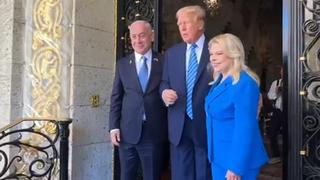Meet Keir Starmer's Jewish wife, bringing Shabbat to No. 10 Downing Street
From regularly observing Shabbat to maintaining strong connections with the Jewish community, Victoria's influence extends beyond the domestic sphere.
Victoria Starmer, a Jewish woman with a rich cultural heritage and deep-rooted traditions, is poised to become the UK's first lady.
Intertwined with her Jewish upbringing, her life story plays a significant role in shaping the values and practices of her family.
From regularly observing Shabbat to maintaining strong connections with the Jewish community, Victoria's influence extends beyond the domestic sphere into her husband, Labour leader Keir Starmer's political career.
As Keir stands on the brink of becoming the next prime minister, Victoria's steadfast commitment to her faith and cultural traditions, as well as her involvement in combating antisemitism, emphasizes the unique role she will play as the new first lady of the UK.
Victoria Starmer, originally Victoria Alexander, was born in 1963 in North London.
Her father was of Polish-Jewish descent, and her mother, a community doctor, converted to Judaism upon marriage.
Growing up, Victoria was immersed in Jewish traditions and cultural practices, which played a significant role in shaping her values and outlook on life.
According to The Jewish Chronicle, “Victoria’s father is Jewish – they came from Poland – and her mother converted when they got married."
Family and Jewish practices
In the Starmer household, Jewish traditions are actively observed and cherished. Despite Keir being an atheist, the family regularly observes Shabbat, marking the weekly day of rest with family gatherings and traditional rituals.
In an interview with The Jewish Chronicle, Keir mentioned, "Every week there’s a challah, and we say kiddush," highlighting the importance of these rituals in their family life.
Their children are raised with a strong awareness of their Jewish identity, participating in various Jewish customs and celebrations.
Keir has emphasized the importance of these traditions in their home, ensuring that their children understand and appreciate their cultural and religious heritage.
The family belongs to the Liberal Jewish Synagogue in St. John's Wood, London, reflecting their active participation in the Jewish community.
According to the Jewish Chronicle, Keir stated, “My wife in particular wants our children to know the faith of her family."
The Liberal Jewish Synagogue is part of the Liberal Jewish movement, a progressive strand of Judaism similar to Reform Judaism in the US.
It focuses on modern interpretations of Jewish traditions and inclusivity, providing a welcoming environment for Jews of all backgrounds and levels of observance.
This inclusive approach aligns well with the Starmers' values, fostering a sense of belonging and community.
Public life and Jewish identity
Victoria's Jewish heritage is a significant, though understated, aspect of her public persona.
She actively participates in Jewish community activities, giving her family unique cultural richness.
By maintaining strong ties to their Jewish roots, the Starmers ensure that their children grow up with a deep understanding of their heritage.
Despite her husband's high-profile political position, Victoria prefers to stay out of the political spotlight, focusing on her professional responsibilities and family life.
The fact that the incoming prime minister's wife is an engaged Jew is particularly relevant given the Labour Party's recent history with accusations of antisemitism.
Keir has made it clear that his commitment to tackling antisemitism in the Labour Party is a matter of principle and values, reinforced by the cultural and religious practices observed in their home.
He reiterated this commitment in a speech to Labour Friends of Israel, emphasizing that "anti-Zionist antisemitism is the antithesis of the Labour tradition."
Connection to Israel
Victoria's connection to Judaism inherently links her to Israel. She has family living in Israel, and Keir has expressed deep concern for their safety amid the October 7 massacre.
His stance on Israel is supportive, emphasizing the right of Israel to defend itself while advocating for peace and a two-state solution. Keir stated during a Labour conference, “I utterly condemn the senseless murder of men, women, and children, including British citizens, in cold blood by the terrorists of Hamas."
In an interview with LBC, he also expressed “deep concern” for his extended family in Israel and highlighted the “incredible anxiety” they were experiencing.
Keir added, “We stand by our Jewish communities here, and we stand by Israel internationally." He also noted that antisemitic attacks in the UK have trebled since the conflict began, stating, “[Antisemitic] attacks are not a one-off."
Keir Starmer emphasized Israel's right to defend itself and the need to adhere to international law, stating, "Everything must be done within international law."
He criticized the BBC for their refusal to label Hamas as terrorists, asserting that terrorism is “obviously what we are witnessing."
Discussing long-term solutions to the conflict, Starmer highlighted the importance of peace proposals and a two-state solution, stating, “We do need to get back to peace proposals and a two-state solution,” and added, “What Hamas has done has pushed that further away, and deliberately."
Antisemitism in the Labour Party
Over the past decade, the Labour Party has faced significant criticism and controversy over allegations of antisemitism.
Under Jeremy Corbyn's leadership, numerous incidents and complaints of antisemitic behavior and rhetoric within the party were reported.
This led to investigations and widespread condemnation from Jewish communities and beyond. The Equality and Human Rights Commission (EHRC) published a report in 2020 detailing the party's failure to adequately address these issues, highlighting a "breakdown of trust" between the Labour Party and the Jewish community.
Upon becoming the leader of the Labour Party, Keir Starmer made a public commitment to "root out antisemitism" and restore trust, stating that there would be "zero tolerance" for such behavior within the party.
Labour's recent election success
Keir Starmer's Labour Party is poised to end the Conservative Party's 14-year rule in the UK, with Labour expected to secure a significant majority in parliament.
An exit poll suggests Labour will win 410 of the 650 seats, highlighting widespread voter dissatisfaction with the Conservatives over the cost of living crisis and political instability. Prime Minister Rishi Sunak conceded defeat, acknowledging the party's poor performance.
Nigel Farage's Reform UK party, advocating right-wing populism, also made notable gains.
Despite Labour's victory, Starmer faces numerous challenges, including economic issues, strained public services, and Brexit-related concerns.
















